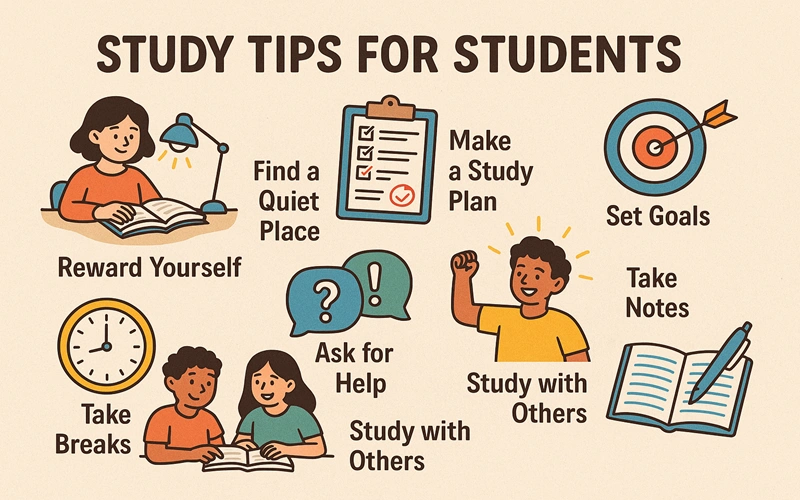Studying doesn’t have to be boring or stressful. In fact, when done the right way, it can be exciting and even fun! If you are a student who wants to improve your learning, remember more of what you read, and score better in tests, this article is for you. These study tips for students are designed to make your study time smarter, not harder.
1. Create a Quiet and Comfortable Study Space
The first step to successful studying is choosing the right place. Your environment can make a big difference. Find a quiet corner where you won’t be distracted. Keep your desk clean and organized. Make sure the lighting is good so you don’t strain your eyes. Some students like a little background music, while others prefer complete silence. Try both and see what works best for you.
Pro Tip: Keep all your study supplies like notebooks, pens, and books within reach, so you don’t waste time getting up again and again.
Read More: dgmnews.com
2. Set a Daily Study Schedule
One of the most powerful study tips for students is to study at the same time every day. When you make studying a habit, it becomes part of your routine, just like brushing your teeth.
Break your day into small chunks of study time. For example, instead of trying to study for 3 hours straight, do three 30-minute sessions with short breaks in between. This helps your brain stay fresh and focused.
Use a Planner or Calendar: Write down what subjects you will study each day. Check them off as you finish. It feels great to see your progress!
3. Use the Pomodoro Technique
Here’s a simple trick used by many students and even adults: the Pomodoro Technique. You study for 25 minutes, then take a 5-minute break. After four rounds, take a longer break of 15–20 minutes. This keeps your brain sharp and helps you avoid burnout.
Tip: During your 5-minute break, get up, stretch, drink some water, or take deep breaths. Avoid checking your phone or social media, as it can easily distract you for longer than 5 minutes!
4. Write Things Down – Don’t Just Read
Reading is important, but writing things down helps you remember them better. When you write, your brain has to work harder, and this makes the information stick. Summarize what you read in your own words, or make flashcards with key points.
Use Colorful Notes: Try using colored pens or highlighters. Make diagrams, charts, or mind maps. This makes studying fun and easier to remember.
5. Practice, Don’t Just Memorize
Many students make the mistake of only memorizing facts. But the best study tips for students encourage practice and active learning. That means doing exercises, solving problems, or teaching the material to someone else.
Teach What You Learn: Try explaining what you learned to a friend or family member. If you can teach it clearly, that means you really understand it!
6. Take Care of Your Body and Mind
Your brain works best when your body is healthy. That means:
-
Get enough sleep (7–9 hours for most students)
-
Eat healthy food like fruits, vegetables, and nuts
-
Drink plenty of water
-
Exercise regularly – even a short walk helps your brain stay active
Also, try to stay positive. It’s okay to make mistakes or have a bad day. Don’t give up – keep going!
7. Use Technology Wisely
Today’s students have lots of cool tools to help them learn. Use apps like:
-
Quizlet (for flashcards)
-
Khan Academy (for math and science help)
-
Google Docs (to share notes with friends)
But remember – your phone can be a big distraction, too. Try using “focus mode” or apps that block social media during study time.
8. Ask Questions and Get Help
Never feel shy about asking questions. If you don’t understand something, speak up! Whether it’s a teacher, a classmate, or even online help, getting answers quickly keeps you from falling behind.
Form a study group with friends. Just make sure everyone stays focused. Group study can be great for sharing notes and learning together.
9. Review Regularly
One of the smartest study tips for students is to review old material often. Don’t just study something once and forget about it. Go back every few days to review it again. This is called spaced repetition and it’s a proven way to remember things for a long time.
Use flashcards or quizzes to test yourself. The more often you review, the easier it will be when test day comes.
10. Stay Motivated with Small Rewards
Studying for long hours can feel hard. So, reward yourself for small wins. After a 30-minute study session, give yourself a treat – maybe a favorite snack, 10 minutes of a game, or a quick walk.
Celebrate your progress. Every time you learn something new, you’re getting better and smarter. That’s something to be proud of!
11. Avoid Cramming Before Exams
Cramming means trying to learn everything at the last minute. It’s one of the worst habits! Your brain can’t absorb so much information in one night. Instead, study a little every day, starting weeks before your exam.
This way, when the exam comes, you’ll feel calm and confident.
12. Believe in Yourself
The most powerful tip of all? Believe in yourself. Every student can be a great learner with the right attitude and habits. Don’t compare yourself with others. Learn at your own pace and stay focused on your goals.
Use these study tips for students regularly, and over time, you’ll see a big difference in your results, your confidence, and your love for learning.
Final Thoughts
Studying doesn’t have to be stressful or boring. With the right tips, tools, and mindset, any student can become a better learner. Whether you’re in primary school or preparing for college, these study tips for students will help you stay organized, motivated, and successful.
Remember to take care of your body, manage your time wisely, and always stay curious. Learning is a journey, and every step you take brings you closer to your goals.
FAQs
1. How many hours should a student study each day?
Most students do well with 1 to 3 hours a day, depending on their age and class level. The key is not how long you study, but how well you use your time.
2. What is the best time to study?
This depends on the student. Some people learn better in the morning, while others are more focused in the evening. Try both and see when you feel most alert and productive.
3. What should I do if I get distracted easily?
Try using the Pomodoro Technique (25 minutes study, 5 minutes break), keep your phone away, and study in a quiet place. Also, make a list of your goals before starting to stay focused.
Read More: money6x .com


